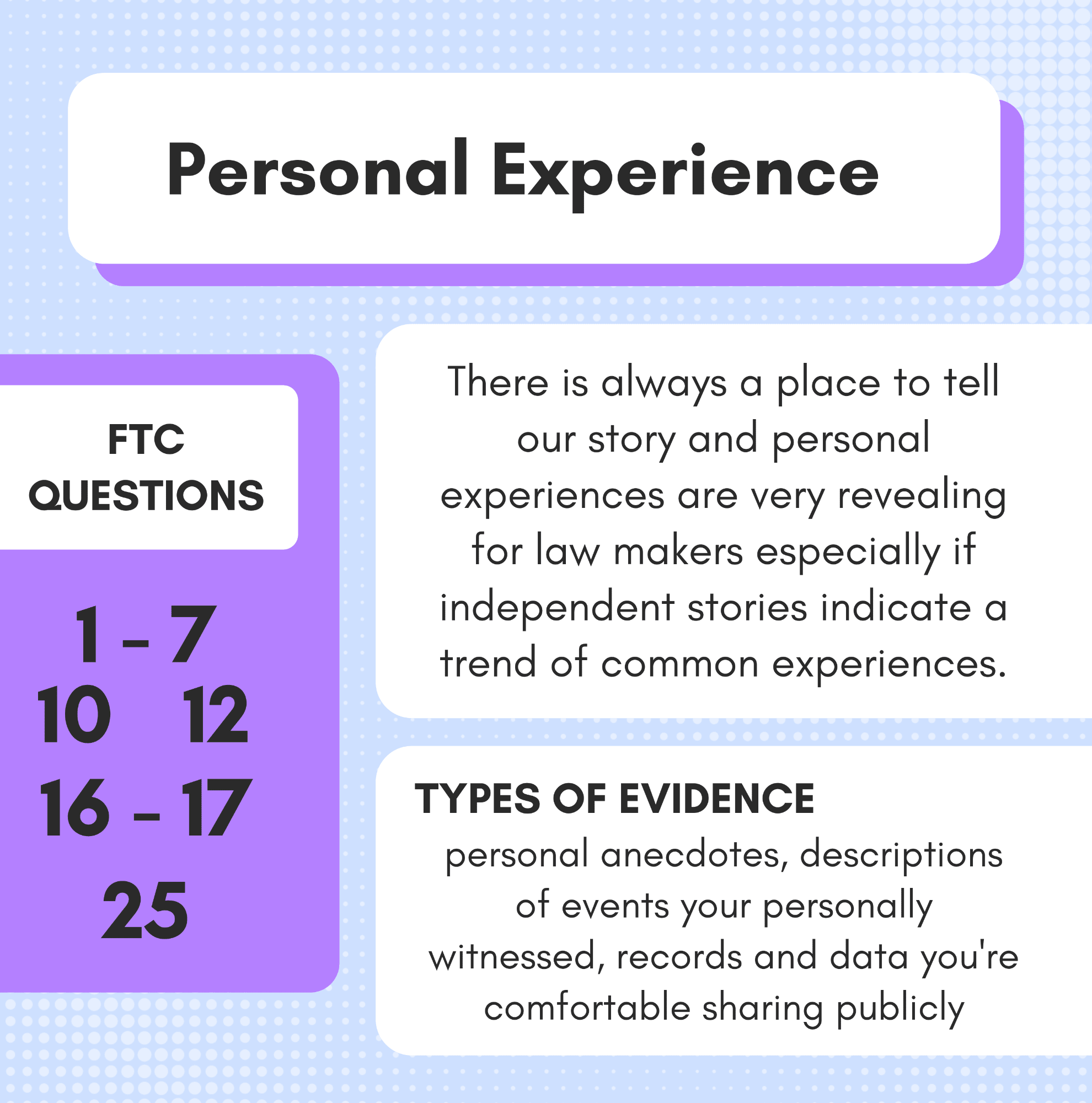Which FTC questions should you comment on?
The following quiz is designed to help you focus your FTC comment on the new Business Opportunity Rule. All of the comments request substantial evidence to support your comment. You can find the original FTC announcement document here:
https://www.ftc.gov/policy/federal-register-notices/16-cfr-part-462-trade-regulation-rule-use-earnings-claims
BACKGROUND
The 2011 Business Opportunity Rule (https://www.ftc.gov/enforcement/rules/rulemaking-regulatory-reform-proceedings/business-opportunity-rule) was originally considered in 2006 to address a near endless flow of earnings claims, which prompted FTC action, from MLM companies. Through the coordinated efforts, supported in large part by the Direct Selling Association and facilitated by various lines of sponsorship within Amway, MLMs prevented this regulation by encouraging the FTC to adopt an under $500.00 limitation to the Business Opportunity Rule that would (presently or in the near future as of 2011) exempt most MLM company starter kits. This was in large part due to the volume of responses they received from distributors (nearly 17,000).
WHY YOU SHOULD HELP
In order to bring appropriate action against MLM companies we need to mobilize as many people as possible to share their thoughts and comments on this rule-making. This quiz is designed to help you focus your efforts and comments where they can be most effective.
Your responses are geared more towards witnessing earnings claims. The questions most relevant to this area of expertise include:
- Questions 1 - 6
- Question 10
- Question 12
- Questions 13 - 15
- Questions 21 - 22, 24
These can be quickly summarized with the following focus questions (be sure to include any and all evidence in your responses):
- How widespread is the use of false, unsubstantiated or otherwise misleading earning claims within MLM? Where is it most prevalent and how does it spread to others?
- How are individuals (prospective representatives and general product consumers) impacted by these false claims?
- In your experience, has anything been effective in limiting the use of these false/misleading claims?
- What proof should be expected with the presentation of earnings claims (if any are tolerated to be made)?
- What should new legislation specify as appropriate language when making statements about joining an MLM company?
- How much are these problems related to individuals vs. the companies themselves?
- Under what conditions would an earnings disclaimer not be necessary?
- How might a disclosure serve to inform decisions of consumers prior to their purchase of products or joining an MLM opportunity?
In case you're curious you also rated highly in the following segments:
{result #2 percent} Lifestyle Claims
{result #3 percent} Unreliable Data
{result #4 percent} Targeted Groups
{result #5 percent} Implications / Alternatives
{result #6 percent} Personal Experiences
Your comment may be made here:
https://www.regulations.gov/
(link will be updated once comment session opens)
Be sure to place this text in your subject line:
Earnings Claims ANPR, R111003
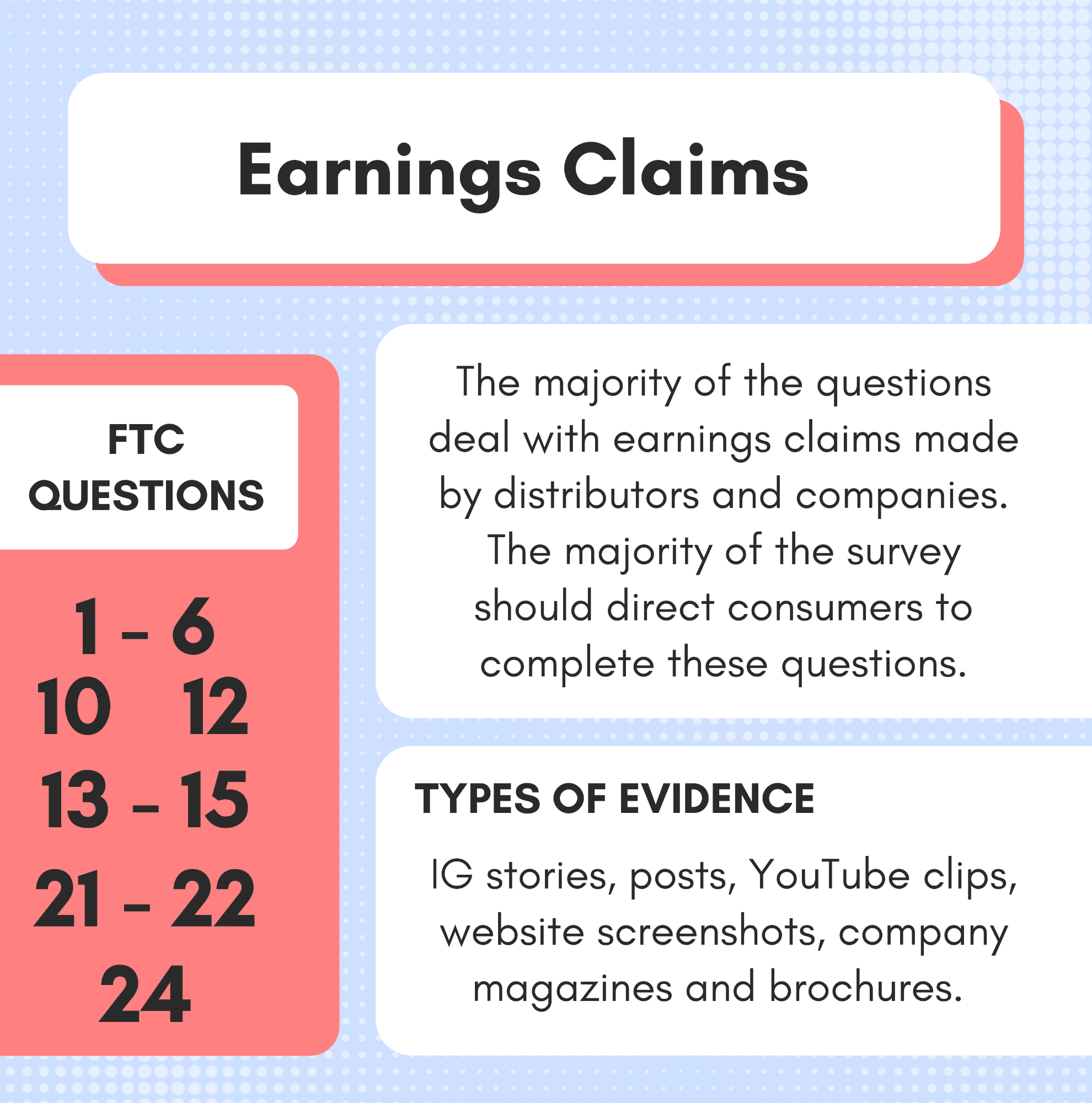
Your responses are geared more towards witnessing lifestyle claims. The questions most relevant to this area of expertise include:
- Questions 16 - 17
- Questions 1 - 6
- Question 10
- Question 12
- Questions 13
These can be quickly summarized with the following focus questions (be sure to include any and all evidence in your responses):
- How do consultants and MLM corporate offices misrepresent the opportunity with luxury claims?
- How do these claims impact prospective consultants?
- How do these claims impact prospect consumers?
- What should be done to properly regulate these claims?
- What would the cost to these businesses be of this proposed change? Would they exceed the benefit to consumers?
- How should individuals be expected to provide proof of such lifestyle claims?
- Who is ultimately responsible for these lifestyle claims, the corporation or the individual representative?
- How should disclaimers be formatted for individuals wishing to market their lifestyle with MLM as a main component of their online presence?
In case you're curious you also rated highly in the following segments:
{result #1 percent} Earning Claims
{result #3 percent} Unreliable Data
{result #4 percent} Targeted Groups
{result #5 percent} Implications / Alternatives
{result #6 percent} Personal Experiences
Your comment may be made here:
https://www.regulations.gov/
(link will be updated once comment session opens)
Be sure to place this text in your subject line:
Earnings Claims ANPR, R111003
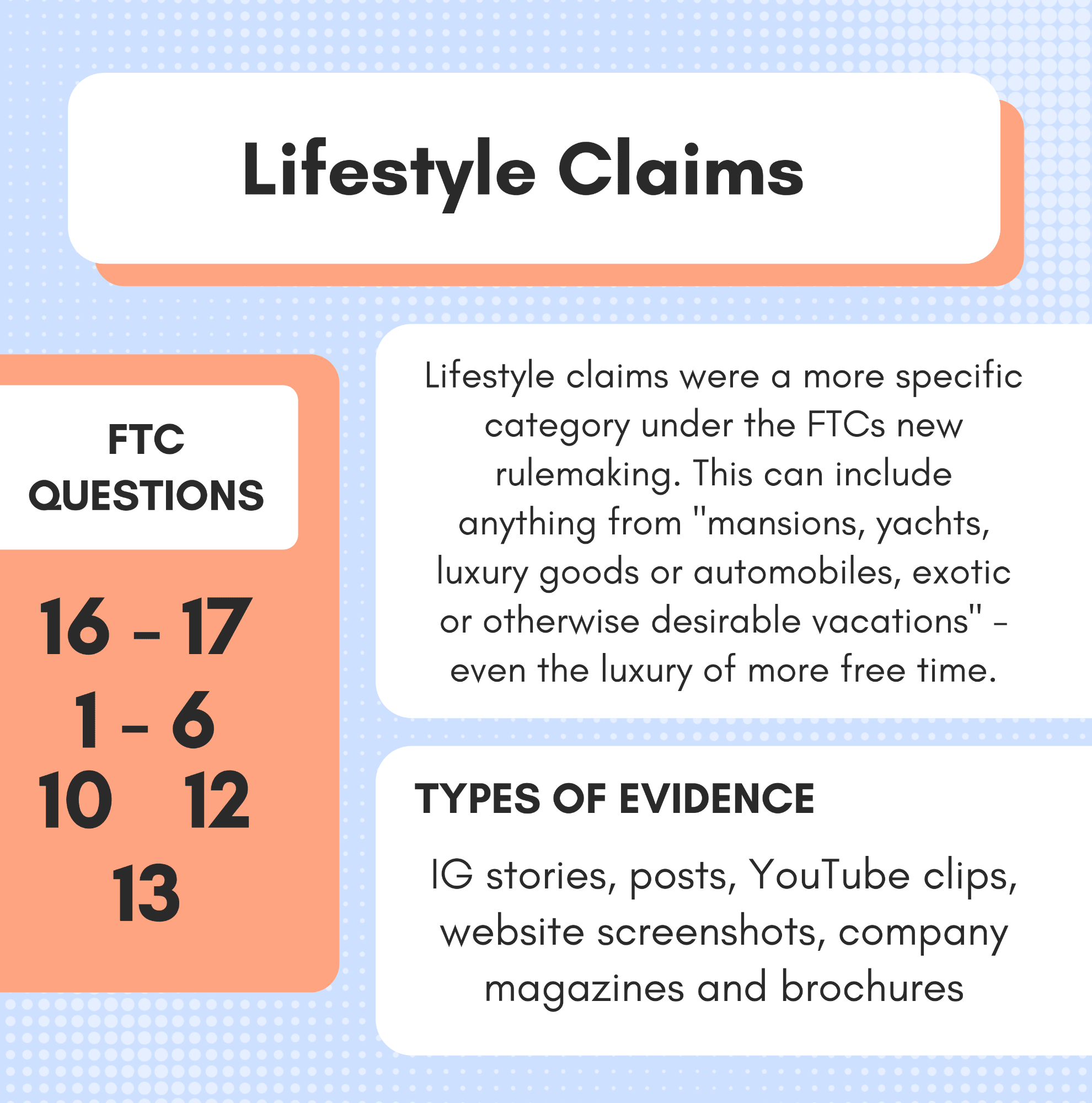
Your responses are geared more towards experiencing concerning practices by major MLM industry bodies. The questions most relevant to this area of expertise include:
- Question 23
- Question 25
- Question 27
These can be quickly summarized with the following focus questions (be sure to include any and all evidence in your responses):
- How widespread is the use of false, unsubstantiated or otherwise misleading earning claims within MLM? Where is it most prevalent and how does it spread to others?
- How does industry data falsely represent information for individuals looking to become involved in an MLM opportunity?
- How do these corporate industry self-regulators undermine current and possible future regulation?
In case you're curious you also rated highly in the following segments:
{result #1 percent} Earning Claims
{result #2 percent} Lifestyle Claims
{result #4 percent} Targeted Groups
{result #5 percent} Implications / Alternatives
{result #6 percent} Personal Experiences
Your comment may be made here:
https://www.regulations.gov/
(link will be updated once comment session opens)
Be sure to place this text in your subject line:
Earnings Claims ANPR, R111003
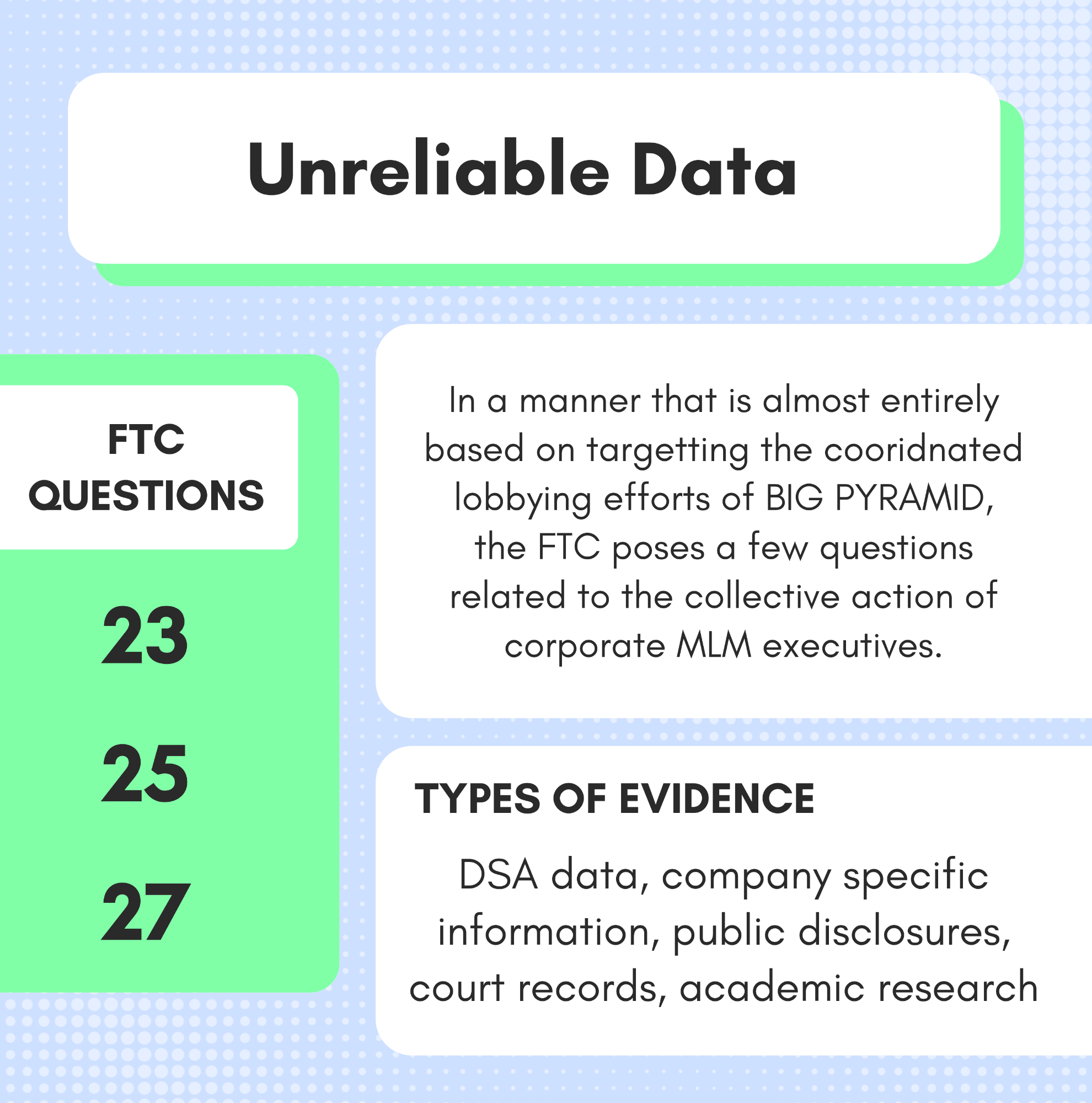
Your responses are geared more towards experiencing abuse as a targeted group in an MLM. The questions most relevant to this area of expertise include:
- Questions 4 - 5
- Question 8
- Question 12
These can be quickly summarized with the following focus questions (be sure to include any and all evidence in your responses):
- How widespread is the use of false, unsubstantiated or otherwise misleading earning claims within MLM? Where is it most prevalent and how does it spread to others?
- In what ways do MLMs target specific categories of individuals? How are these individuals impacted by these false claims?
- How can legislation minimize the targeting of these groups?
- In your experience, has anything been effective in limiting the use of these false claims?
- What should new legislation specify as appropriate language when making statements about joining an MLM company?
- How much are these problems related to individuals vs. the companies themselves?
In case you're curious you also rated highly in the following segments:
{result #1 percent} Earning Claims
{result #2 percent} Lifestyle Claims
{result #3 percent} Unreliable Data
{result #5 percent} Implications / Alternatives
{result #6 percent} Personal Experiences
Your comment may be made here:
https://www.regulations.gov/
(link will be updated once comment session opens)
Be sure to place this text in your subject line:
Earnings Claims ANPR, R111003
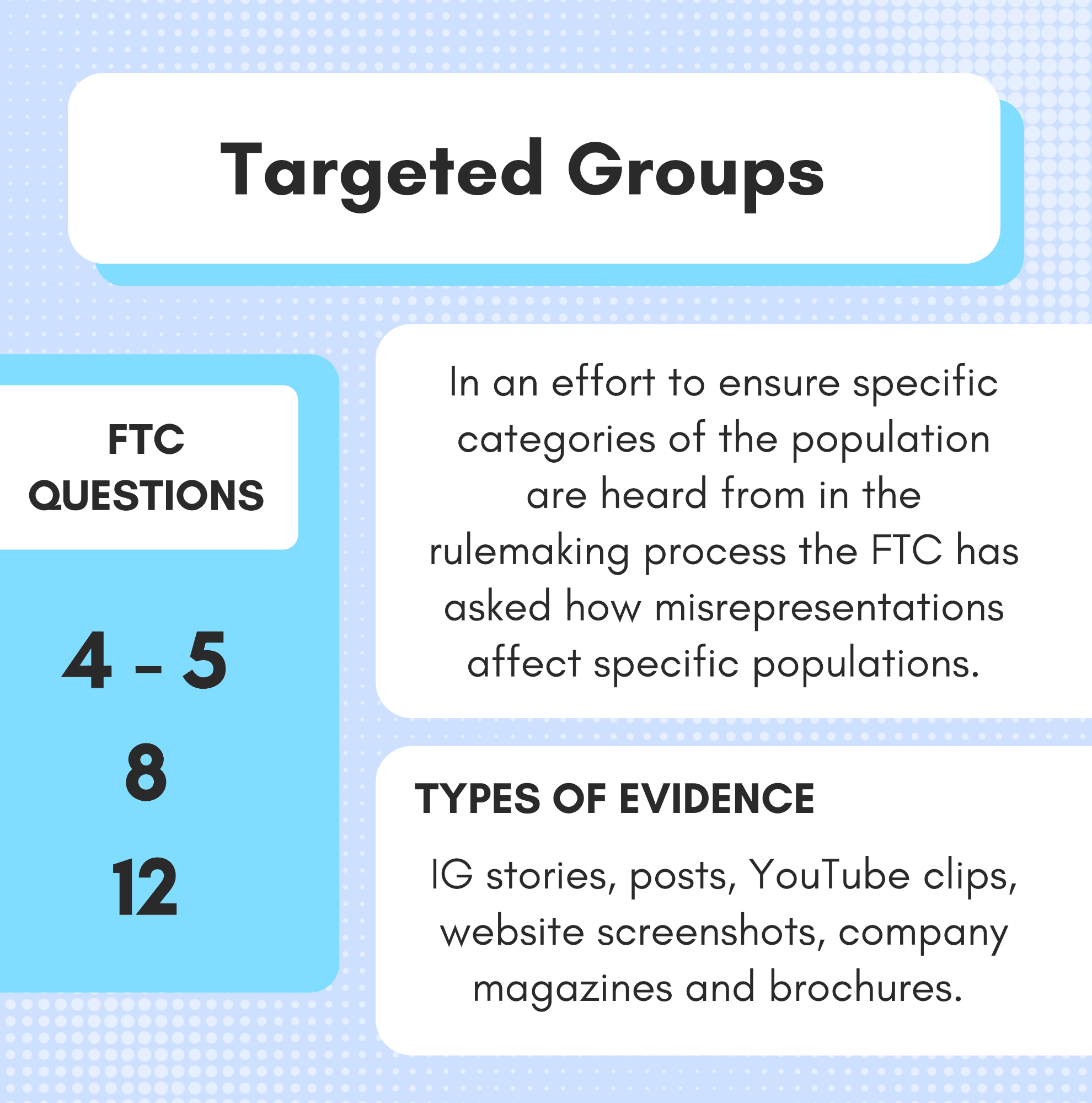
Your responses are geared more towards the implications of the new ruling and current legislation adjustments. The questions most relevant to this area of expertise include:
- Questions 6 - 7
- Questions 8 - 11
- Questions 13 - 15, 21 - 22, 24
- Questions 18 - 20
- Questions 26 - 28
https://www.ftc.gov/policy/federal-register-notices/16-cfr-part-462-trade-regulation-rule-use-earnings-claims
These can be quickly summarized with the following focus questions (be sure to include any and all evidence in your responses):
- How can new legislation minimize compliance cost to companies while still maximizing benefit to consumers?
- Is anyone being left out of the proposed rule?
- What alternatives to regulation should be considered to prevent the harms of false claims?
- How specific should the stipulations within the law be?
- How long should documents related to proof of claims be required to be kept?
- How can disclaimers be codified so they present a more accurate image of success? Also, how should non-mandatory disclosures of earnings claims be outlined for representatives?
- Which businesses or individuals should be specifically exempted from this rule-making?
- How should existing legislation (Business Opportunity Rule, Franchise Rule, Telemarketing Sales Rule) be amended?
- Is there overreach that negatively impacts typical small businesses or other commercial enterprises not targeted in this proposed legislation?
- How does and will the ever-changing role of technology impact decisions related to rule-making in this area?
In case you're curious you also rated highly in the following segments:
{result #1 percent} Earning Claims
{result #2 percent} Lifestyle Claims
{result #3 percent} Unreliable Data
{result #4 percent} Targeted Groups
{result #6 percent} Personal Experiences
Your comment may be made here:
https://www.regulations.gov/
(link will be updated once comment session opens)
Be sure to place this text in your subject line:
Earnings Claims ANPR, R111003
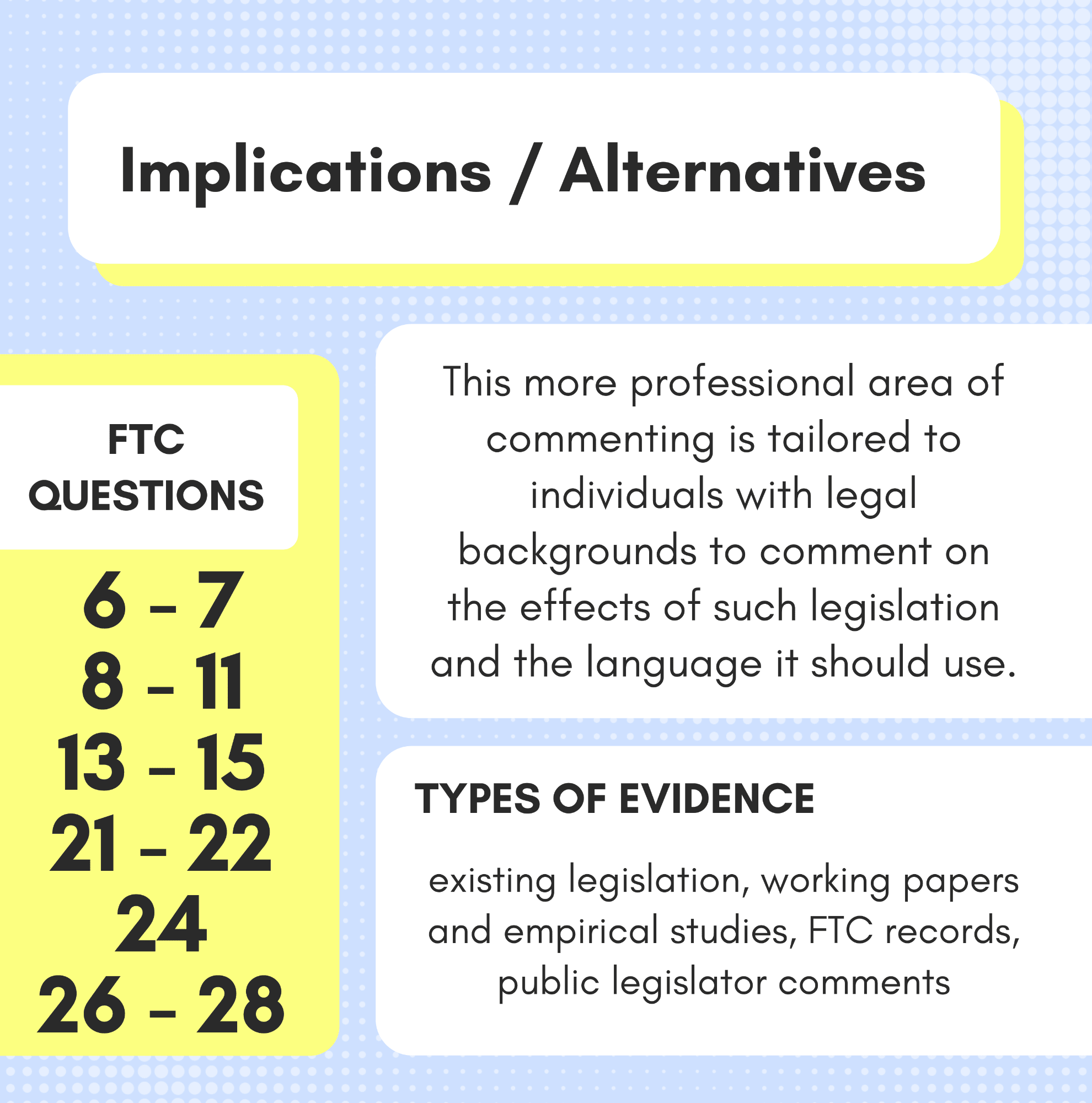
Your responses are geared more towards sharing about your personal experiences with MLM. The questions most relevant to this area of expertise include:
- Questions 1 - 7, 25
- Question 10
- Question 12
- Questions 16-17
These can be quickly summarized with the following focus questions (be sure to include any and all evidence in your responses):
- How widespread is the use of false, unsubstantiated or otherwise misleading earning claims within MLM? Where is it most prevalent and how does it spread to others?
- How are individuals impacted by these false claims?
- In your experience, has anything been effective in limiting the use of these false claims?
- What should new legislation specify as appropriate language when making statements about joining an MLM company?
- How much are these problems related to individuals vs. the companies themselves?
- In addition to specific monetary claims, how are lifestyle claims also misrepresentative and how do they lead to consumer harm?
In case you're curious you also rated highly in the following segments:
{result #1 percent} Earning Claims
{result #2 percent} Lifestyle Claims
{result #3 percent} Unreliable Data
{result #4 percent} Targeted Groups
{result #5 percent} Implications / Alternatives
Your comment may be made here:
https://www.regulations.gov/
(link will be updated once comment session opens)
Be sure to place this text in your subject line:
Earnings Claims ANPR, R111003
